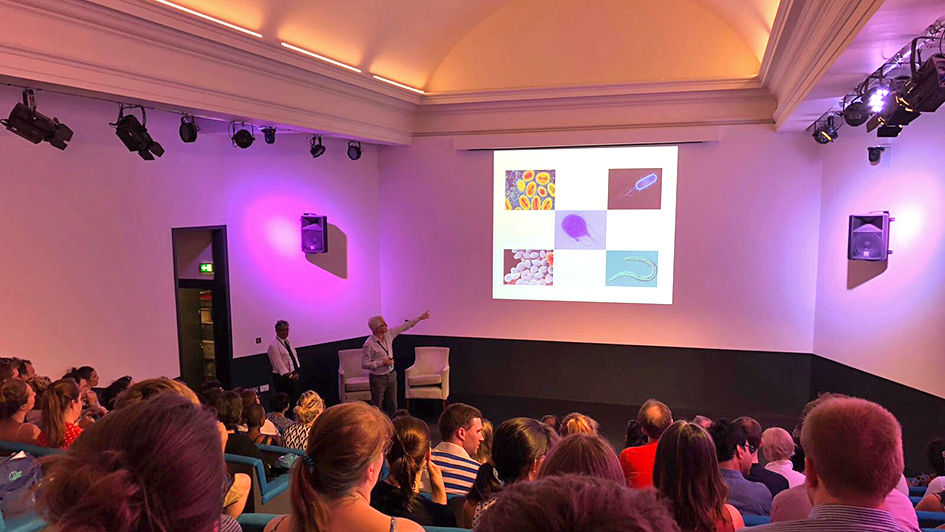
Image: Professors Kevin Harrington (right) and Rajesh Chopra (left) presenting at the Science Museum Lates event on 25 July 2018. Credit: Sarah Wells, ICR
Cancer immunotherapy is an area that is capturing the public's imagination, with stories about patients having astonishing responses to immunotherapies continuing to hit the headlines. So it's important for scientists to find opportunities to engage directly with the public, sharing the excitement from the field whilst also highlighting its ongoing challenges.
Earlier this week, I attended an evening event at London's Science Museum themed around medicine (#SMLates). On the agenda was a talk from Professors Raj Chopra and Kevin Harrington from The Institute of Cancer Research, London and The Royal Marsden NHS Foundation Trust titled: 'Immunotherapy - A New Hope for All'.
The scientists began by explaining the difference between our innate and adaptive immune systems.
Using the analogy for the former as being like a dog barking in the same way when reacting to a threat, while the adaptive immune response is more refined - more like having an army, navy and an air force. Importantly, they highlighted that if a country has been attacked, they learn how to respond to a similar threat in the future.
Our plans for our immunotherapy research are ambitious – but with your support today, we can make these plans a reality and give greater numbers of cancer patients a vital extra lifeline.
Read more
A brief history of cancer immunotherapy
They next outlined a brief history of cancer immunotherapy, starting more than 100 years ago with the pioneering work of William Coley and the incredible responses he achieved by injecting cancer patients with Streptococcus.
They also covered the development of bone marrow transplantation in the 1950s, with the success for leukaemia patients that was tempered by graft-versus-host disease.
Moving on to cover the significant advances over the last decade, they began with the incredible responses to CAR-T cell therapy in some patients with blood cancers.
However, they were careful to emphasise its ongoing challenges from both its high-cost, managing side-effects and difficulties with achieving similar responses in solid tumours.
Checkpoint inhibitors
Next came a lesson on the biology of checkpoint inhibitors. They excited the audience about the 4,000 patients who have now been treated with ipilimumab (anti-CTLA-4) and shared a list of the many other targets currently being investigated.
But the pair were careful to balance their excitement about the potential of immunotherapy with caution, emphasising that not all patients respond to treatment.
Professor Harrington ended the presentation by talking about his own work where he is aiming to turn 'cold' tumours (which have evolved to shut out the immune system) into 'hot' tumours using viruses.
He highlighted T-Vec, a genetically engineered herpes virus, which is the first treatment of its kind now licensed to treat patients with advanced melanoma skin cancer.
During the Q&A after their talk, a member of the audience asked a probing question about drug resistance and long-term survival. Professor Chopra's uplifting response was:
“We know that the immune system can co-evolve with the cancer - it's the only treatment that can.”
This blog was originally written for Nature’s map of cancer immunity, which is building a community of researchers around an interactive figurative version of the cancer-immune setpoint to contribute to its continued evolution.
In the long-term, this innovative crowdsourcing approach aims to provide an up-to-date catalogue of all the different factors from an individual’s biology, immunology or physiology that can influence their response to immunotherapy.
comments powered by